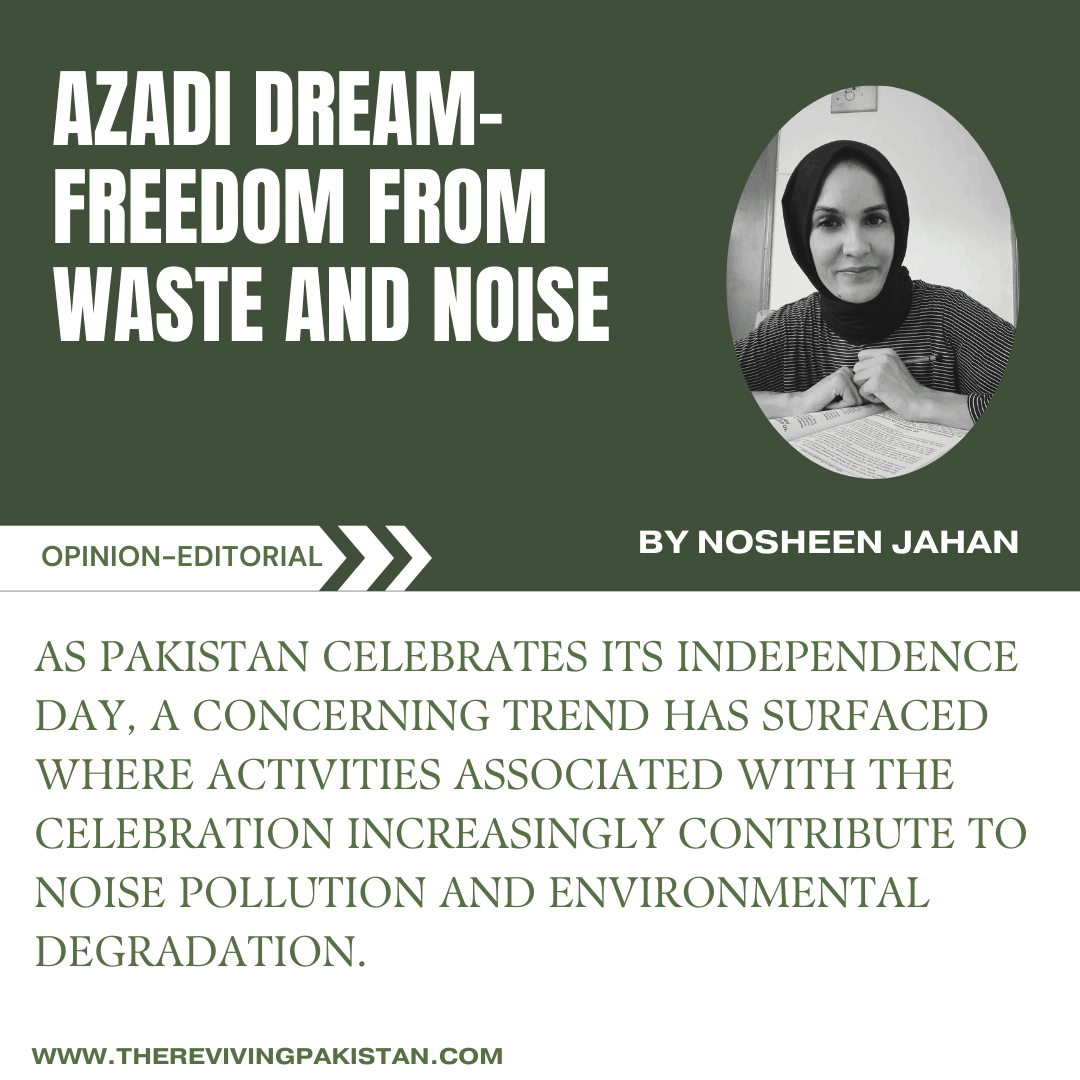As Pakistan celebrates its Independence Day, a concerning trend has surfaced where activities associated with the celebration increasingly contribute to noise pollution and environmental degradation. Parents, in their enthusiasm often buy noisy items like plastic horns and chain balls for their children, unaware of the negative impact these choices have on the environment and community wellbeing. The prevailing belief is that this is the only way to celebrate. But who is responsible for perpetuating this mindset- parents, sellers, or societal norms? It is disheartening to see our independence celebrations reduced to a mere spectacle of waste and noise, leaving behind only trash and disruption.
The plastic horns commonly found in children’s hands not only create noise but also contribute to littering and blockage of sewerage systems. This poses a serious threat to both the environment and public health creating disturbance in residential areas, traffic congestion, and chaos on the roads, which can lead to conflicts and accidents. The noise also results in stress, hearing loss, and sleep disturbance for many people.
Two individuals Akbar Hussain and Sobia Akram, shared their experience of the distributive effects of this noise. Akbar Hussain had his sleep disrupted by the constant noise of Bajas played by children in the street, which started at 7 am and continued until 1 am. He noted that this would continue until their horns broke. The incessant blaring of horns on roads significantly contributes to traffic congestion. The load and jarring noise startles drivers, pedestrians, and other road users, leading to confusion and accidents. Sobia Akram witnessed people breaking traffic rules near Charing Cross Lahore because the traffic police whistles were inaudible due to loud Bajas. These incidents reflect the urgent need for Pakistani citizens to redefine the true meaning of freedom and patriotism.
While we achieved political freedom decades ago from British colonial rule, we struggle with another bondage. We have liberated ourselves from external tyranny, but remain enslaved to our destructive habits. Our Azadi must extend beyond historical freedom to include a future where our national celebrations are marked by respect for the environment and heritage.
The constitution of Pakistan underscores this need by guaranteeing the fundamental rights to life and dignity, which encompasses the right to a clean and healthy environment. Article 9 of the Constitution states, “No person shall be deprived of life or liberty”. This implies that citizens have the right to a safe and healthy environment, free from harmful elements like noise and waste pollution. Moreover, Article 14 of the Constitution ensures the “dignity of man” where noise and waste can be seen as violations of human dignity, as they create an unhealthy and uncomfortable living environment.
As a citizen of Pakistan, we have the right to demand a noise-free and waste-free environment and the judiciary and the government have a responsibility to ensure that these rights are protected. Pakistan is the seventh most vulnerable country to climate change, our responsibility to the environment is more than ever. Our cities, like Karachi and Lahore, consistently rank among the most polluted in the world, highlighting the urgent need for change.
Traditional celebrations involving noise and waste-such as plastic horns, paper flags, and fireworks do more harm than good. These practices contribute to air and noise pollution, increase waste, and degrade the environment. In a country already reeling from the impact of pollution and climate change, it’s imperative that we adopt sustainable celebration practices. Eco-friendly alternatives like tree planting, clean-up drives, and community service can promote national pride while supporting environmental health. By choosing suitable celebrations, we honor our country’s past, and future, ensuring a cleaner, healthier Pakistan for generations to come.
Banning plastic horns is a step to ensure a clean and healthy environment. Courts and government have a crucial role to play in promoting eco-friendly methods of celebration. On August 15, 2022, a concerned citizen filed a petition in the Lahore High Court (LHC) seeking a ban on plastic toy horns and whistles during Independence Day. The petitioner argues that these items contribute to noise pollution, harming the environment and public health. Despite the petitioner’s validity, the LHC rejected it because Independence Day had passed, rendering the petition not maintainable. However, this decision overlooked the fact that the noise pollution and waste pollution generated by these items persist even after August 14th, as plastic horns continue to be used until they break, contributing to waste pollution.
The LHC’s rejection of the petition to ban plastic horns is a missed opportunity to address the ongoing issue of noise and waste management. The court failed to address the long-term consequences of noise pollution and waste management which will continue to affect Pakistan unless sustainable solutions are implemented. By not guiding eco-friendly celebrations and sustainable solutions, the court missed a chance to direct the government to organize alternative measures and promote a clean and healthy environment for future generations. The court’s inaction denies citizens the right to be free from waste and noise guaranteed by the constitution of Pakistan.
If the court had prioritized a simple yet impactful measure like planting a tree over the expensive plastic horns, it could have ensured the sounds of birds instead of noise and gifted this to future generations through the current one. Unfortunately, the court failed to seize this opportunity.

